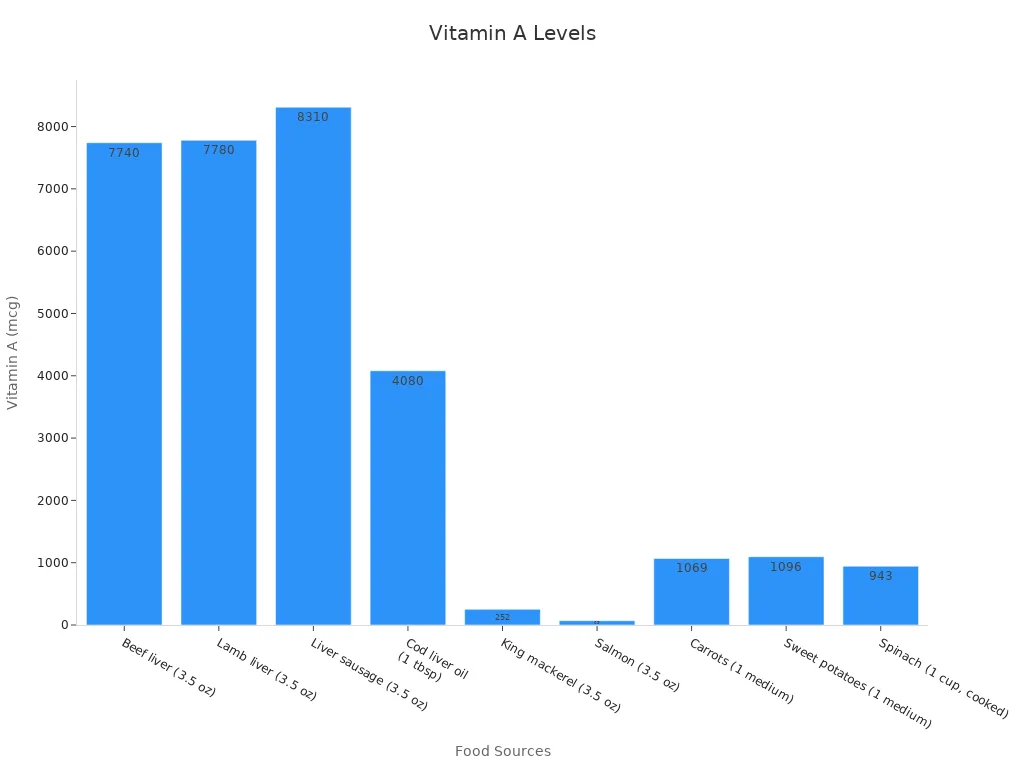Vitamin A and Cancer: Can It Help?

Vitamin A plays a crucial role in maintaining cellular health and supporting your immune system. Its antioxidant properties help protect tissues from damage caused by harmful molecules, which may lower the risk of certain cancers. Some studies suggest that higher intake of Vitamin A and related compounds could reduce the risk of cancers like pancreatic cancer. However, other research highlights conflicting results, such as an increased risk of breast cancer with supplemental Vitamin A use. These findings show that the relationship between Vitamin A and cancer is complex and influenced by factors like dosage and individual health.
Key Takeaways
Vitamin A is important for healthy cells and a strong immune system. It might help reduce cancer risk.
Foods like liver, eggs, and bright fruits and veggies have Vitamin A. These are safer than pills.
Too much Vitamin A can cause big health problems. Follow the suggested amounts.
Talk to a doctor before using Vitamin A pills, especially if you are sick.
Eat foods with Vitamin A to stay healthy and possibly avoid cancer.
Understanding Vitamin A and Its Role

What Is Vitamin A?
Vitamin A is an essential nutrient that your body needs to maintain good health. It belongs to a group of fat-soluble compounds that play a key role in vision, growth, reproduction, and immune function. Your body cannot produce Vitamin A on its own, so you must obtain it through your diet.
Scientists measure Vitamin A levels using specific indicators. For example, serum retinol levels below 0.70 mmol/l suggest a risk of deficiency. Other measures, like night blindness or low breast milk retinol, also indicate inadequate Vitamin A levels.
Indicator | Cut-off to indicate deficiency |
|---|---|
Night blindness (24-71 mo) | ≥ 1% report a history of night blindness |
Serum retinol | < 0.70 mmol/l indicates risk |
Breast milk retinol | < 1.05 mmol/l indicates low stores |
Relative dose response | ≥ 20% indicates deficiency |
Modified relative dose response | Ratio ≥ 0.06 indicates depletion |
Types of Vitamin A and Their Functions
Vitamin A exists in two main forms: preformed Vitamin A and provitamin A carotenoids. Preformed Vitamin A, found in animal products like liver and eggs, is readily used by your body. Provitamin A carotenoids, found in plant-based foods like carrots and spinach, must be converted into retinol before your body can use them.
Different types of Vitamin A have varying conversion rates to retinol. For instance, 1 μg of dietary Vitamin A equals 1 μg of retinol, while 12 μg of dietary β-carotene equals 1 μg of retinol.
Quantity Consumed | Quantity Bioconverted to Retinol | RAE Ratio |
|---|---|---|
1 μg of dietary Vitamin A | 1 μg of retinol | 1:1 |
12 μg of dietary β-carotene | 1 μg of retinol | 12:1 |
24 μg of dietary α-carotene | 1 μg of retinol | 24:1 |
Vitamin A's Role in Cellular and Immune Health
Vitamin A supports your immune system by enhancing the production of white blood cells, which fight infections. It also helps regulate cell growth and differentiation, processes that are crucial for maintaining healthy tissues.
Research shows that Vitamin A supplementation improves inflammatory biomarkers and boosts immune function. For example, studies reveal that Vitamin A deficiency lowers antibody responses, making you more vulnerable to infections. Additionally, Vitamin A acts as an anti-infective agent, reducing mortality in children.
Evidence Type | Findings | Source |
|---|---|---|
Systematic Review | Improves inflammatory biomarkers and immunity | |
Animal Studies | Deficiency lowers antibody responses | |
Clinical Evidence | Reduces mortality in children |
Vitamin A and cancer research highlights its potential to regulate cell growth and protect tissues, but more studies are needed to confirm these effects.
Scientific Evidence on Vitamin A and Cancer
Studies Linking Vitamin A to Cancer Prevention
Research has shown that Vitamin A may play a role in preventing certain types of cancer. Retinol and its derivatives have been studied for their ability to regulate cell growth and repair damaged tissues. Scientists have discovered that the downregulation of a protein called CRBP-1 is associated with more aggressive forms of breast, ovarian, and nasopharyngeal cancers. When CRBP-1 is reexpressed, it enhances retinol sensitivity and reduces the viability of ovarian cancer cells in laboratory experiments.
Globally, nine randomized controlled trials have examined the effects of dietary antioxidant supplements, including Vitamin A, on cancer prevention. These studies highlight the potential of Vitamin A to protect against cancer, but the results vary depending on the type of cancer and the population studied.
CRBP-1 downregulation linked to aggressive cancers.
Reexpression of CRBP-1 improves retinol sensitivity.
Nine global trials conducted on dietary antioxidants for cancer prevention.
Research on Vitamin A in Cancer Treatment
Clinical trials have also explored the role of Vitamin A in cancer treatment. Some studies suggest that Vitamin A may benefit patients with cancers like leukemia and prostate cancer. However, the findings are not always consistent. For example, one study found no significant link between antioxidant levels and prostate cancer outcomes.
Study Type | Number of Patients | Key Findings |
|---|---|---|
Review | 8786 patients studied. Potential benefits in leukemia and prostate cancer. No significant link in one study. |
These mixed results highlight the need for more research to understand how Vitamin A can be effectively used in cancer treatment.
Conflicting Evidence and Research Gaps
While some studies show promising results, others reveal conflicting evidence about the relationship between Vitamin A and cancer. For instance, high doses of Vitamin A supplements have been linked to an increased risk of certain cancers, such as lung cancer in smokers. This suggests that the effects of Vitamin A depend on factors like dosage, individual health, and lifestyle.
You should also consider the gaps in current research. Many studies focus on specific populations or cancer types, making it difficult to generalize the findings. Future research should aim to address these limitations and provide clearer guidance on the role of Vitamin A in cancer prevention and treatment.
Mechanisms of Vitamin A Against Cancer

Antioxidant Effects and Tissue Protection
Vitamin A acts as a powerful antioxidant, protecting your cells from damage caused by free radicals. Free radicals are unstable molecules that can harm tissues and increase the risk of cancer. By neutralizing these harmful molecules, Vitamin A helps maintain the integrity of your tissues. This protective effect is especially important in organs like the lungs and skin, which are frequently exposed to environmental toxins.
Studies have shown that higher serum Vitamin A levels are linked to a reduced risk of certain cancers. For example, research by Kim et al. found that individuals with higher Vitamin A levels experienced a seven-fold decrease in the risk of benign breast disease and a six-fold decrease in breast cancer risk.
Study | Finding | Risk Reduction |
|---|---|---|
Kim et al. | Serum vitamin A levels | 7-fold decrease in benign breast disease |
Kim et al. | Serum vitamin A levels | 6-fold decrease in breast cancer |
Regulation of Cell Growth and Differentiation
Vitamin A plays a critical role in regulating how your cells grow and differentiate. This process ensures that cells develop into their proper forms and functions. When cells grow uncontrollably or fail to mature properly, they can become cancerous. Vitamin A helps prevent this by promoting apoptosis, a natural process where damaged or abnormal cells self-destruct.
In breast cancer cells, Vitamin A has been shown to induce re-differentiation, essentially "resetting" transformed cells to behave more like normal ones. It also regulates the TET2–PKC pathway, which increases apoptosis in cancer cells. Additionally, retinoic acid, a derivative of Vitamin A, activates pro-apoptotic signaling through interferon regulatory factor-3, further contributing to tumor cell death.
Role in Immune System Modulation
Your immune system plays a vital role in identifying and destroying cancer cells. Vitamin A strengthens this defense by enhancing the activity of white blood cells, which are essential for fighting infections and abnormal cells. It also supports the production of antibodies, improving your body's ability to target and eliminate threats.
Research highlights Vitamin A's ability to modulate immune responses, making it a key player in cancer prevention. By boosting your immune system, Vitamin A helps your body detect and destroy cancer cells before they can grow and spread. This dual role in immune enhancement and cellular regulation underscores its potential in the fight against cancer.
Risks and Limitations of Vitamin A
Potential Side Effects of Excessive Intake
Taking too much Vitamin A can lead to harmful side effects. These effects depend on whether the toxicity is chronic or acute. Chronic toxicity develops over time and may cause severe headaches, hair loss, skin problems, weakness, or an enlarged liver or spleen. These symptoms usually improve within 1 to 4 weeks after stopping excessive intake. Acute toxicity, on the other hand, occurs quickly, often after a single large dose. It can cause headaches, rashes, drowsiness, stomach pain, or nausea. Children are especially vulnerable to acute toxicity after consuming megadoses.
Type of Toxicity | Symptoms | Notes |
|---|---|---|
Chronic | Severe headaches, hair issues, skin issues, weakness, enlarged liver/spleen | Symptoms can take 1-4 weeks to resolve after stopping intake. |
Acute | Headache, rash, drowsiness, stomach pain, nausea | Common in children after megadose ingestion. |
Safe Dosage Guidelines
To avoid these risks, you should follow safe dosage recommendations. Experts suggest that if you need to take Vitamin A supplements, the daily dose should not exceed 400 µg. This guideline comes from the Bundesinstitut für Risikobewertung (BfR), a trusted authority on health and safety. Staying within this limit helps you gain the benefits of Vitamin A without risking toxicity.
Maximum daily dose: 400 µg (if supplementation is necessary).
Who Should Be Cautious With Vitamin A?
Certain groups need to be extra careful with Vitamin A intake. People with conditions like xerophthalmia, Bitot's spots, or night blindness may already have altered Vitamin A metabolism. Those with a history of measles or recent diarrhea should also monitor their intake, as these conditions can affect how the body processes Vitamin A.
Condition | Treatment Group (%) | Control Group (%) |
|---|---|---|
Active Xerophthalmia | 1.9 | 2.3 |
Bitot's Spots | 1.2 | 1.4 |
Night-blindness | 1.1 | 1.3 |
Measles History | 22.3 | 21.7 |
Diarrhea (past 7 days) | 7.1 | 8.7 |
If you belong to one of these groups, consult a healthcare provider before taking Vitamin A supplements. This ensures you get the right amount without increasing health risks.
Incorporating Vitamin A Into Your Lifestyle
Dietary Sources of Vitamin A
You can find Vitamin A in a variety of foods, both animal-based and plant-based. Preformed Vitamin A, which your body can use immediately, is abundant in animal products like liver, fish, eggs, and dairy. For example, beef liver contains 7,740 mcg of Vitamin A per 3.5 ounces, making it one of the richest sources. Cod liver oil also provides a significant amount, with 4,080 mcg per tablespoon.
Plant-based foods, on the other hand, offer provitamin A carotenoids, which your body converts into usable Vitamin A. Carrots, sweet potatoes, and spinach are excellent sources. A medium carrot provides 1,069 mcg, while a medium sweet potato offers 1,096 mcg. These options are particularly beneficial if you follow a vegetarian or vegan diet.
Food Source | Vitamin A Content (mcg) | Type of Vitamin A |
|---|---|---|
Beef liver (3.5 oz) | 7,740 | Preformed Vitamin A |
Lamb liver (3.5 oz) | 7,780 | Preformed Vitamin A |
Liver sausage (3.5 oz) | 8,310 | Preformed Vitamin A |
Cod liver oil (1 tbsp) | 4,080 | Preformed Vitamin A |
Carrots (1 medium) | 1,069 | Provitamin A Carotenoids |
Sweet potatoes (1 medium) | 1,096 | Provitamin A Carotenoids |
Spinach (1 cup, cooked) | 943 | Provitamin A Carotenoids |

Should You Consider Vitamin A Supplements?
Supplements can help if your diet lacks sufficient Vitamin A, but they aren't always necessary. For most people, a balanced diet provides enough of this nutrient. However, certain groups, such as pregnant women or individuals with Vitamin A deficiency, may benefit from supplements. Research shows that adequate Vitamin A intake during pregnancy reduces risks like low birth weight and maternal health complications. Nutrition education and plant-based sources also improve Vitamin A levels in deficient individuals.
Before taking supplements, consult a healthcare provider. Over-supplementation can lead to toxicity, causing symptoms like headaches, nausea, or even liver damage. Stick to the recommended daily allowance to avoid these risks.
Tips for a Balanced Diet Rich in Vitamin A
Incorporating Vitamin A into your meals is easier than you think. Start by adding colorful fruits and vegetables like carrots, sweet potatoes, and spinach to your plate. Include animal-based sources like eggs, dairy, and fish if your diet allows.
Here are some practical tips:
🥗 Add shredded carrots or spinach to salads and soups.
🍳 Use eggs or fortified cereals for breakfast.
🥘 Cook sweet potatoes as a side dish or mash them for a healthier alternative to regular potatoes.
By diversifying your meals, you can ensure a steady intake of Vitamin A while enjoying a variety of flavors and nutrients.
Vitamin A supports cellular health and strengthens your immune system, both of which are essential for cancer prevention and treatment. Research on Vitamin A and cancer shows promise, but the evidence remains inconclusive. Excessive intake can cause serious health issues, so you should prioritize natural sources like fruits, vegetables, and animal products. A balanced diet is the safest way to maintain your health and potentially lower cancer risk. Always consult a healthcare provider before using Vitamin A supplements for cancer-related purposes.
FAQ
What is the best way to get Vitamin A naturally?
Eating a variety of foods rich in Vitamin A is the best approach. Include animal-based sources like liver, eggs, and dairy. Add colorful fruits and vegetables, such as carrots, sweet potatoes, and spinach, to your meals. These options provide both preformed Vitamin A and provitamin A carotenoids.
Can Vitamin A supplements prevent cancer?
Vitamin A supplements may help if you have a deficiency, but they don’t guarantee cancer prevention. Research shows mixed results. Focus on a balanced diet with natural sources of Vitamin A. Always consult your doctor before taking supplements for cancer-related purposes.
Is it safe to take high doses of Vitamin A?
No, high doses can cause toxicity. Symptoms include headaches, nausea, and liver damage. Stick to the recommended daily allowance of 400 µg if you need supplements. For most people, a healthy diet provides enough Vitamin A without the risks of overconsumption.
Who should avoid Vitamin A supplements?
Pregnant women, smokers, and individuals with liver conditions should be cautious. High doses can harm fetal development or increase cancer risks in smokers. If you belong to these groups, consult your healthcare provider before using Vitamin A supplements.
How does Vitamin A support your immune system?
Vitamin A boosts your immune system by enhancing white blood cell activity. It helps your body fight infections and abnormal cells. This nutrient also supports antibody production, improving your ability to target harmful threats effectively.
See Also
Exploring Cancer Types Associated With AIDS Diagnosis
An In-Depth Overview of Various Cancer Categories
Recognizing Symptoms and Treatments for Conjunctival Melanoma
Identifying Symptoms and Treatment Options for Duodenal Cancer

